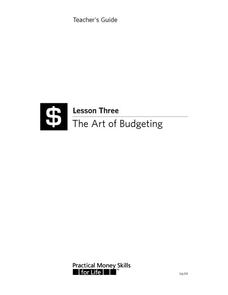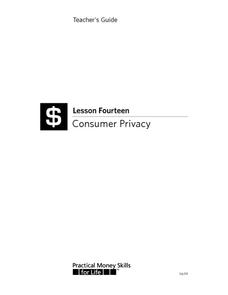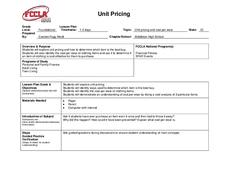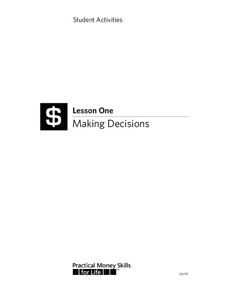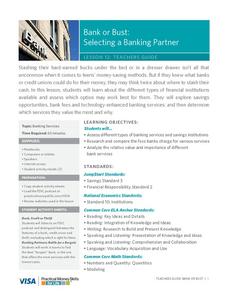Visa
Savvy Spending: Sharpening Money Decisions
Do you really need that new laptop/phone/dress/jacket/etc.? Financial decisions require us to distinguish between our wants and our needs. Through discussion and the evaluation of scenarios on provided worksheets, this resource will...
PwC Financial Literacy
Charitable Giving
Charitable organizations and monetary donations to these organizations are the focus of the financial literacy lesson plan presented here. Learners explore how donations benefit both the organization and the people it serves. Each pupil...
PwC Financial Literacy
Credit Reports
Middle schoolers discover why it's important to establish a positive credit history and understand the value of credit reports to lenders and borrowers. They apply legal guidelines to establish the uses of a credit report other than...
Visa
The Art of Budgeting
Class members learn how to set up and maintain a personal budget through discussion, financial planning worksheets, and a brief PowerPoint presentation.
PricewaterhouseCoopers
The Stock Market
Keep or sell? Young learners simulate as buyers in the stock market while learning about the benefits and important factors to know when purchasing. The thorough resource allows for observation of case studies and provides an assessment...
PwC Financial Literacy
Evaluating Financial Information
Advertising is all around us. Sometimes those advertisements are directed at young people, so it's important for youngsters to recognize false advertising and fraud when they see it. That's what this instructional activity is all about....
PricewaterhouseCoopers
Saving and Investing: Building Wealth for Financially-Secure Futures
While spending is fun, saving for a retirement is the future. Young adults learn about the importance of saving and different opportunities to do so during their adulthood.
Curated OER
Money Smart Teens
Students plan positive goals for spending resources and understand why not to spend. In this financial planning lesson, students set up personal spending plans based on their resources and their long term plans. Students plan for...
Visa
In Trouble
What are some of the financial risks associated with using credit? Pupils learn the warning signs of incurring financial hardship, and through PowerPoint presentations, worksheets, and discussion, discover the implications of such events...
Visa
Consumer Privacy
The availability of personal financial information is of greater importance now than ever before. Your pupils will discuss how public and private records are accessed by various organizations, particularly considering direct mail, credit...
Visa
Buying a Home
What is the difference between buying and renting a home? Learners become more informed consumers and financially literate adults after developing foundational knowledge of the home-buying process.
Visa
Using Credit Wisely
Receiving credit can be both a benefit and a curse. Prepare your learners to make wise credit choices by studying how credit influences credit scores, identifying the different components of credit cards, and exploring major consumer...
Visa
Nothing But Net: Understanding Your Take Home Pay
Introduce your young adults to the important understanding that the money they receive from their paychecks is a net amount as a result of deductions from taxes. Other topics covered include federal, state, Medicare and social security...
Utah Education Network (UEN)
Decision Making
Making decisions, while maybe scary, is a skill that can be learned. Introduce teens to a five-step decision-making process that makes what may seem overwhelming possible. Pupils learn the steps and practice them by playing games,...
Nebraska Department of Education
Who Am I?
When people look in a mirror, they rarely see themselves as others see them. Tweens and teens can consider the significance of these disparities in a lesson that asks them to reflect on the kind of person they are and how they think...
Federal Reserve Bank
Lesson 4: Back to School
Based on your current level of human capital, how long would it take you to earn $1,000,000? What about your potential human capital? Learners explore the importance of education and experience when entering the workforce, and compare...
Curated OER
Unit Pricing
Students explore unit pricing to determine the best buy for their money. In this personal finance lesson plan, students calculate cost per wear examples and create a list of criteria for picking clothes. Students visit a story and use...
Visa
Making Decisions
What economic factors can influence personal and financial decisions? In an effort to understand opportunity costs and the time value of money, pupils engage in role-playing activities and discussion, as well as view a PowerPoint...
PLS 3rd Learning
Find the Fees
Before teens head off to college or the workforce, they need to understand the world of credit. Here, they look online at credit card agreements to find hidden fees and rates. The online activity guides them through and even assesses...
Visa
Cars and Loans
What's the best way to pay for a car? Should I buy used or new? Can I realistically afford a car? Pupils discover the ins and outs of buying a car, from how to shop for car insurance to the advantages and disadvantages of leasing.
Visa
Making Spending Decisions
By role playing real-world experiences, such as purchasing snacks and grocery/toy store shopping, your youngsters will begin to develop an understanding of how to make decisions and choose between alternatives. This is the first lesson...
Visa
A Way to Wealth: Understanding Interest and Investments
Money motivates! Help young bankers understand how math plays a part in investing. Give learners math practice while instilling real-world financial literacy skills.
Visa
Bank or Bust: Selecting a Banking Partner
Why shouldn't we just save all our money in our mattress? Couldn't our money disappear? Pupils discover the benefits of utilizing banks and credit unions for saving money, as well as how to evaluate different types of institutions by...
Visa
Credit Cards
Choosing your first credit card can often be an intimidating and confusing experience for young adults. Give your pupils the foundational knowledge they need for tackling this process head-on, including learning to distinguish different...





